At the behest of the Civil Control Platform and with financial support from the European Union, the company «Active Group» carried out a sociological survey among lawyers, jurists, and citizens involved in legal proceedings, gauging their confidence in Ukrainian judges and evaluating their objectivity.
The survey, involving 521 participants, was carried out in two phases across Dnipro, Kharkiv, and Zaporizhzhia.
The survey was conducted at the following courts:
- Dnipropetrovsk District Administrative and Third Appellate Administrative Court;
- Zaporizhzhia District Administrative Court;
- Second Appellate Administrative and District Administrative Court of Kharkiv.
The survey revealed that in these regions, 70.5% of individuals express trust in the judiciary. A majority of respondents noted the necessity to exert considerable efforts to have their cases addressed. Lawyers contributed minimal efforts in this regard.
According to the findings, 61.6% of respondents assert that decisions in their cases were grounded in legality, while 10.7% express a firm belief that they were unjust.
For deeper insights into public sentiments towards judges in Dnipro, Kharkiv, and Zaporizhzhia, as well as an analysis of courts with prolonged case processing times, read in the comprehensive study of the Civil Control Platform.
Lawyers, attorneys, and citizens assess the ease of access to justice
The majority of respondents claim that they had to exert significant efforts to have their cases considered by judges. On a five-point scale, 18.5% of respondents reported putting in maximum effort, while 25.3% exerted minimum effort.
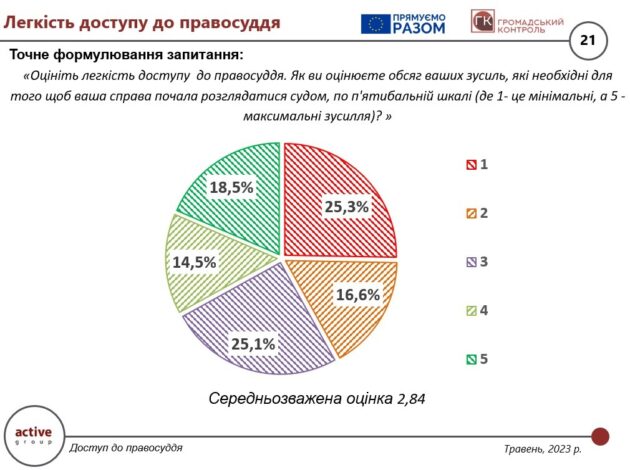
According to the survey data, it was observed that within the Third Appellate Administrative Court in Dnipro, a highest proportion of respondents (37.5%) stated that they had to invest maximum effort to ensure their cases were reviewed by the judges.
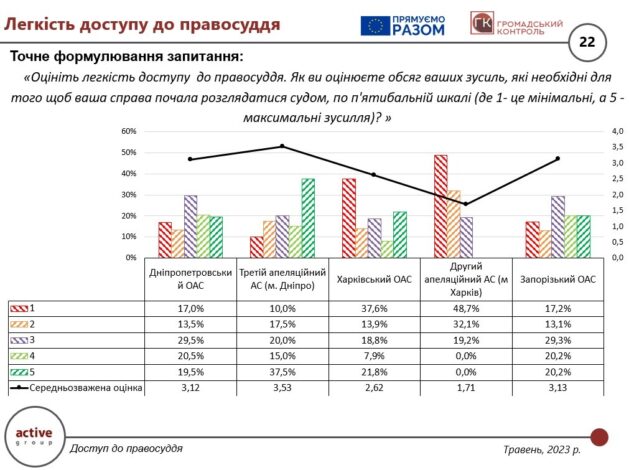
In two Kharkiv courts, the prevailing sentiment among respondents was that accessing justice was relatively easy. Specifically, in the First Appellate Administrative Court, 37.6% of individuals expressed this view, while in the Second Appellate Administrative Court, the figure rose to 48.7%.
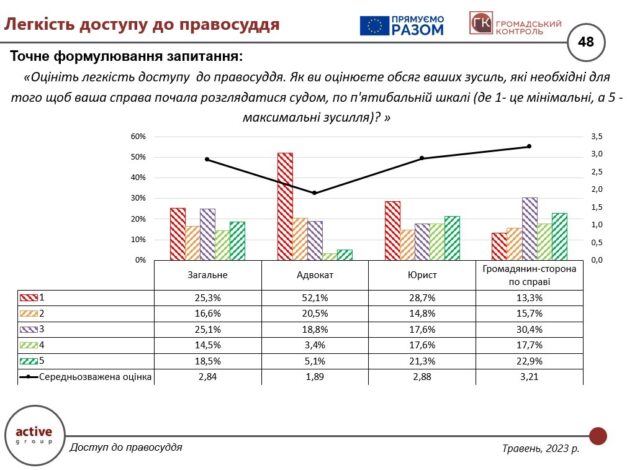
Lawyers (52.1%) exerted the least effort to initiate proceedings in court. Meanwhile, 21.3% of legal professionals and 22.9% of citizens believe they had to invest maximum effort.
Trust in Judges and Perceptions of Corruption
In three regions, people were asked about their level of trust in Ukrainian courts. The majority of respondents (70.5%) expressed trust in the judiciary, while 22.2% expressed distrust.
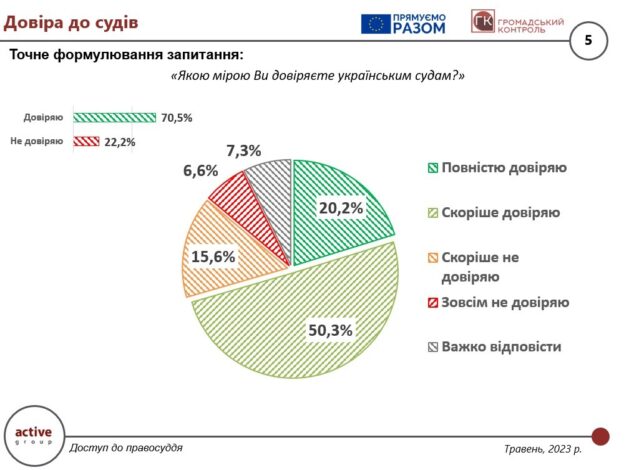
Here are the breakdowns of people’s evaluations:
- Somewhat trust the judiciary: 50.3%
- Fully trust: 20.2%
- Somewhat distrust: 15.6%
- Do not trust at all: 6.6%.
According to the survey, participants of the judicial proceedings have greater trust in the judiciary than respondents who took part in nationwide surveys, the majority of whom have not interacted with the courts.
In particular, in a survey conducted in December 2023 by the Ilko Kucheriv Democratic Initiatives Foundation in collaboration with the sociological service of the Razumkov Center, 60% of Ukrainians expressed distrust in the Supreme Court.
Respondents in the Dnipropetrovsk District Administrative Court expressed the highest level of trust at 79.1%, while the lowest was in the Kharkiv District Administrative Court at 55.5%.
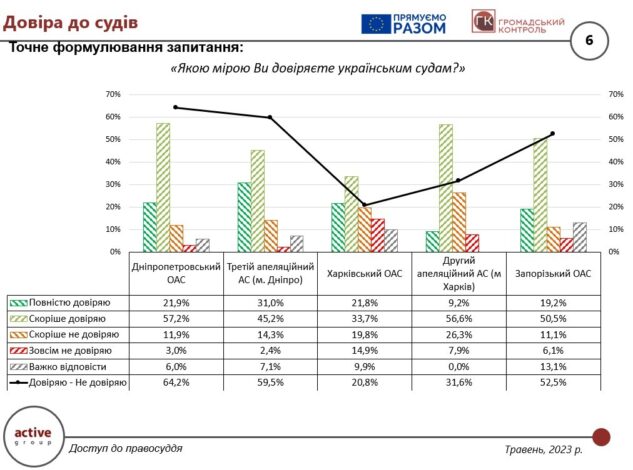
Opinions on the corruption of judges were almost evenly split. 42% of people agreed with this notion, while 42.3% disagreed.
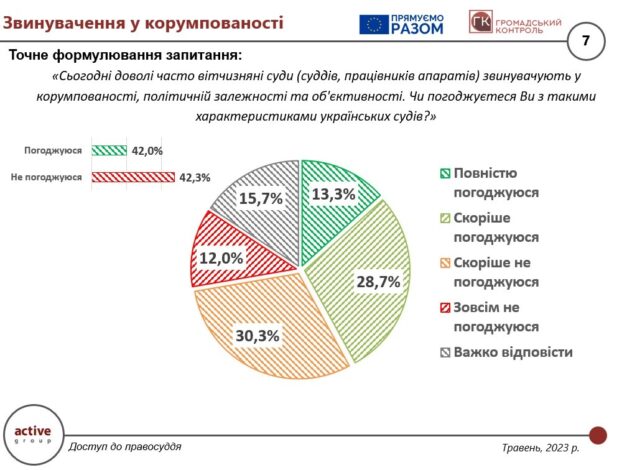
66.6% of respondents questioned near the Third Appellate Administrative Court of Dnipro are confident that employees of Ukrainian courts are involved in corrupt schemes. In contrast, 39.7% of people asked near the Kharkiv District Administrative Court disagree with this assessment.
Assessment of the Judicial System in Ukraine
Respondents were asked to rate, on a scale of ten, their satisfaction with the performance of Ukrainian courts. The majority of them positively evaluated the work of the judicial system, with 19.9% assigning it an 8 out of 10.
On the other hand, 4.4% expressed dissatisfaction, giving the judiciary a rating of one.
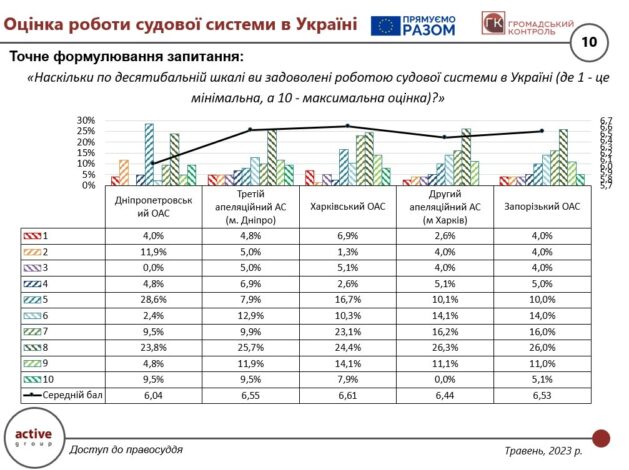
In the Third Appellate Administrative Court of Dnipro (25.7%), the Kharkiv District Administrative Court (24.4%), the Second Appellate Administrative Court of Kharkiv (26.3%), and the Zaporizhzhia District Administrative Court (26%), the majority of respondents highly rate the performance of the judicial system, giving it an 8 out of 10.
In the Dnipropetrovsk District Administrative Court, the majority (28.6%) rate the court’s performance at an average level, giving it a score of 5.
Court Case Processing Timing
17.3% of respondents claim that their cases were heard in court within two months, while 28.8% say this process took two to three months.
Between four to six months, judges reviewed cases for 17.5% of individuals, while 11% experienced case processing times ranging from six to twelve months, and over a year for 6% of respondents.
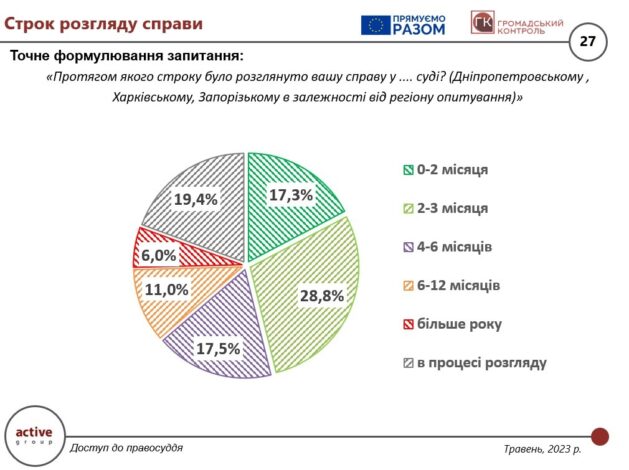
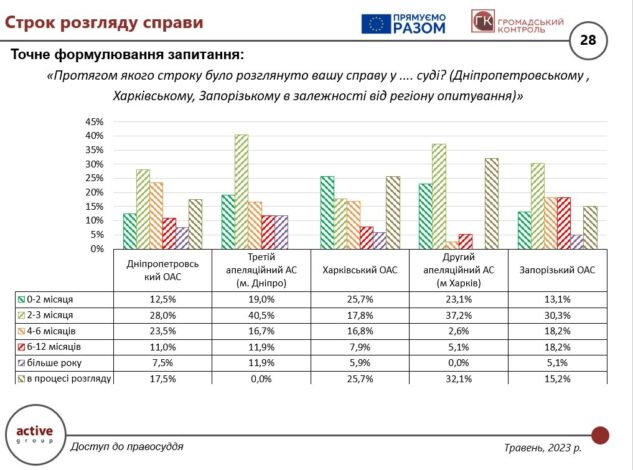
Cases are processed most quickly (within three months) in the Third Appellate Administrative Court of Dnipro and the Second Appellate Administrative Court of Kharkiv.
11.9% of respondents noted that the Third Appellate Administrative Court in Dnipro takes the longest to process cases compared to other courts
Return of the Lawsuit
32.7% of respondents informed that the court returned their lawsuit, while 54.8% stated that this did not occur.
Lawyers were most often confronted with returned statements of claim at 58.7%, whereas citizens encountered this less frequently at 20.9%. A majority of respondents (57.1%) are confident that there were legitimate grounds for the return of the claim, while 8.7% assert that there were no grounds for it.
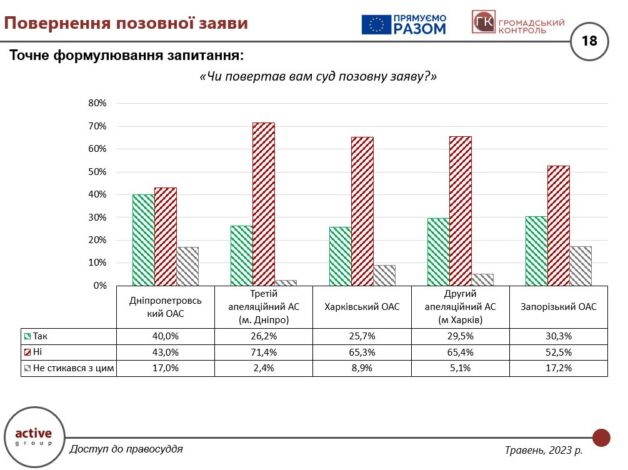
According to the survey, the Dnipropetrovsk District Administrative Court most frequently returned lawsuits, with 40% of individuals informed of this occurrence.
***
This publication was prepared with the financial support of the European Union. Its contents are the sole responsibility of the Civil Control Platform and do not necessarily reflect the views of the European Union.

